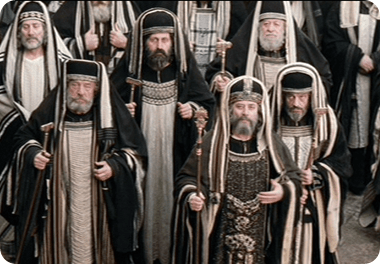
5th Sunday in Ordinary Time
So what really is a Pharisee?
The Pharisees were a social movement and a school of thought in the Holy Land during the time of Second Temple Judaism. After the destruction of the Second Temple in 70 CE, Pharisaic beliefs became the foundational, liturgical and ritualistic basis for Rabbinic Judaism. So a Pharisee was a type of Rabbi.
However Rabbi’s as the Priest’s of Judaism who teach the Torah are to be as respected as Pastor’s and Priests, where as the term “Pharisee” has become derogatory among Christian’s why? Jesus criticized them extensively....he called them “blind leaders, leading the blind” and also said:
The problem with them in the New Testament seemed to be that they often read so far into the literal meaning of a law that they either overshot and completely missed the mark, or undershot and missed an opportunity to do good (which is the “higher law”). They were more concerned with appearing not to sin, than actually doing good. In fact from what the New Testament says they were very vain, spiritual leaders who flaunted their power, position and suffered from the sin of extreme self-righteousness. Thinking themselves better and higher than everybody else. They of all people should have known, God detests hypocrites.
Our Old Testament reading today, spells out exactly what God wants and his detesting of empty religious ritual.....the truth is he wants us to follow the Spirit of the Law more than the Letter of the Law and let Grace cover us, as we do so. Only then can we be what our gospel reading is about ....’Salt and Light’ to the world.
I know that today the Pharisees of our age exist, even within the Christian Church, but I see them more in the academic world....those “great men” who call themselves Theologians and Philosophers, but have never experienced the ‘baptism of the Holy Spirit’ and therefore don’t really understand the Bible at all. Some don’t really believe in God at all and pull apart the Bible, under a microscope of their own making to cause others to doubt parts of its authenticity. They complicate the gospel message which is actually intended to be simple and easy to understand. Paul wrote of ones like these in our New Testament reading today. Don’t be like them, as he says, they will fall. Keep it simple and obey the Spirit of the Law more than the letter of it.
 Welcome
Welcome Calendar
Calendar Today's Word
Today's Word Lauds
Lauds Terce
Terce Sext
Sext None
None Vespers
Vespers Compline
Compline Matins
Matins